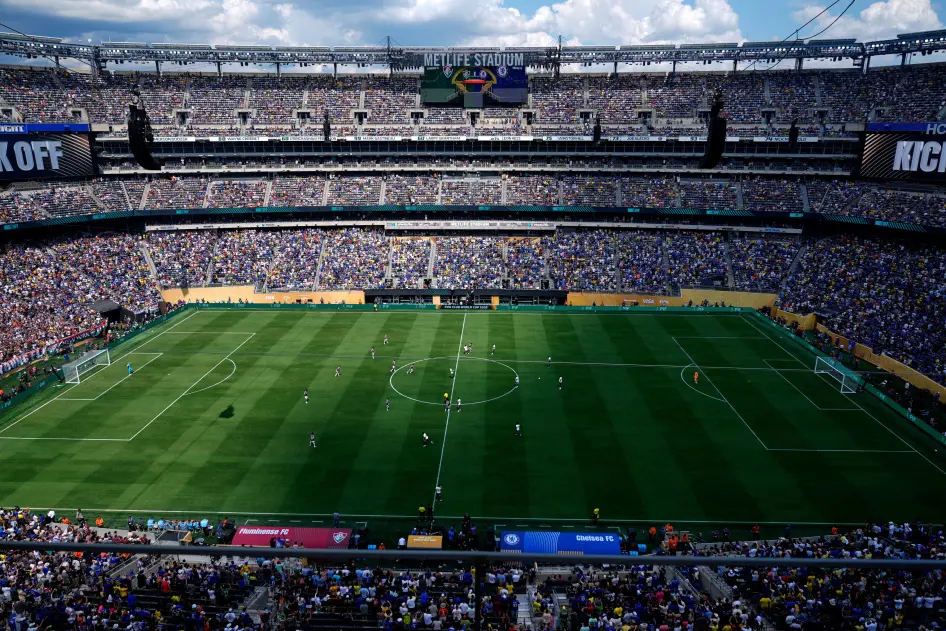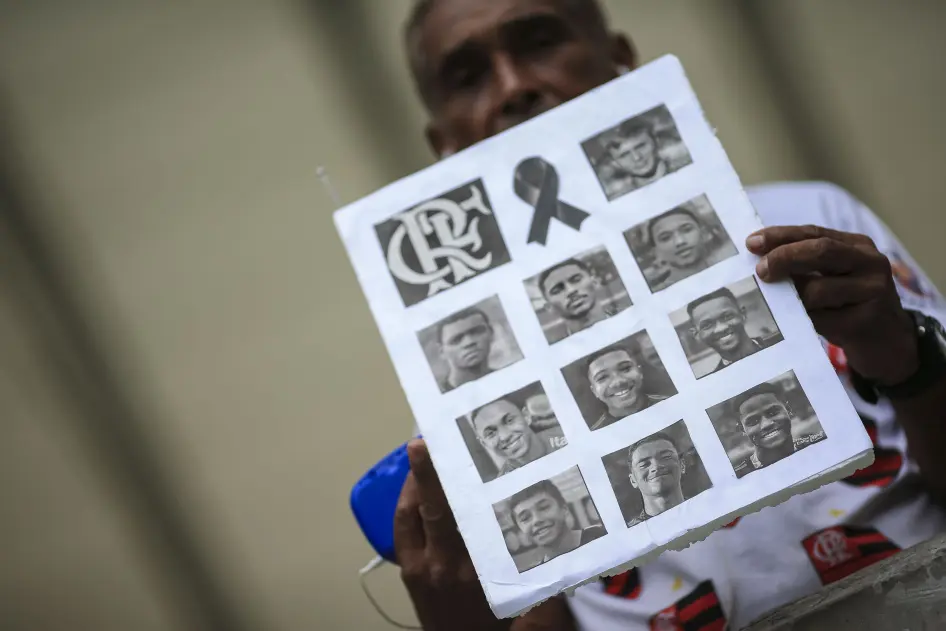Human rights groups, football supporters, worker organisations express “deep concern” at global law firm’s flawed World Cup 2034 assessment
A flawed human rights assessment of Saudi Arabia’s FIFA 2034 World Cup bid by AS&H Clifford Chance – part of the global partnership of London-based law firm Clifford Chance – leaves the global firm at risk of being linked to abuses which result from the tournament, 11 organisations said today.
AS&H Clifford Chance, which is based in Riyadh and sits within Clifford Chance’s integrated global partnership, produced an “independent human rights context assessment” that was published by FIFA and which has helped pave the way for Saudi Arabia to be confirmed as 2034 hosts on 11 December, as is widely expected to happen. The assessment contains no substantive discussion of extensive and relevant abuses in Saudi Arabia documented by multiple human rights organisations and UN bodies. It formed the basis of Saudi Arabia’s human rights strategy for the tournament, which was described by Amnesty International as a “whitewash”.
The 11 organisations, which include a Saudi Arabian diaspora organisation, Gulf human rights groups, and labour organisations, as well as Football Supporters Europe, Amnesty International and Human Rights Watch, wrote to Clifford Chance’s Global Managing Partner, setting out in detail all the concerns in this statement, and inviting the authors to publish an updated report. The firm, which says that it works in partnership with “some of the world’s leading NGOs and civil society organisations”, said in response last week that it would be “inappropriate” to offer any further comment on the report and shared a link to publicly available company policies.
“It has been clear for more than a year now that FIFA is determined to remove all potential obstacles to make sure it can hand Saudi Arabia’s Crown Prince Mohammed bin Salman the 2034 World Cup,” said James Lynch, co-director of the FairSquare human rights organisation, which led the joint approach to the law firm. “By producing a shockingly poor report, AS&H Clifford Chance, part of one of the world’s largest law firms that makes much of its human rights expertise, has helped to remove a key final stumbling block.”
Saudi Arabia’s already dire human rights record has deteriorated under the de facto rule of Crown Prince Mohammed bin Salman, who has presided over a soaring number of mass executions, torture, enforced disappearance, severe restrictions on free expression, repression of women’s rights under the male guardianship system, LGBTI+ discrimination, and the killing of hundreds of migrants at the Saudi Arabia-Yemen border. The country’s abusive Kafala (labour sponsorship) system, as well as the prohibition on trade unions and lack of enforcement of labour laws continues to lead to the widespread exploitation of migrant workers.
The 11 organisations warned Clifford Chance that, through the production of its human rights assessment by AS&H Clifford Chance, there is a risk that the firm could be linked to potential adverse human rights impacts resulting from a Saudi Arabia-hosted tournament.
“AS&H Clifford Chance had the chance to write a credible assessment of risks that are relevant to the 2034 World Cup. Instead they have produced an artificially limited, misleading and overly positive perspective, that serves only to whitewash the reality of abuse and discrimination faced by Saudi Arabia’s citizens and residents,” said Julia Legner, Executive Director of ALQST for Human Rights, a Saudi Arabian diaspora organisation.
In their memorandum to Clifford Chance, the organisations set out, and requested comment on, three overarching concerns about the assessment. Taken together, these fatally undermine the report’s claim to provide an independent assessment of the human rights context in Saudi Arabia, relevant to the hosting and staging of the 2034 World Cup.
- AS&H Clifford Chance agreed to a decision by FIFA and the Saudi Arabian Football Federation (SAFF) to effectively exclude analysis of Saudi Arabia’s record on multiple critical human rights such as freedom of expression, LGBTI+ discrimination, the prohibition of trade unions, or forced evictions – either because Saudi Arabia has not ratified the relevant treaties or because SAFF did not accept them as “applying”. Any assessment that does not recognise these as relevant human rights risks for a World Cup in Saudi Arabia cannot be considered credible.
- The assessment made highly selective use of the findings of UN bodies on Saudi Arabia, leaving out damaging judgements. For example, it fails to reference one UN body’s concern at receiving reports that “torture and other ill-treatment are commonly practised in prisons”, or another which notes that “women and girls who are victims of sexual abuse risk facing criminal proceedings if they press charges”. It does not mention that Saudi Arabia is currently facing a labour complaint at the UN brought by Building and Woodworkers International, an international trade union. No reports by UN Special Rapporteurs are included, meaning for example that there is no reference to the imposition of the death penalty in relation to the Crown Prince’s flagship giga-project Neom, nor the murder of Saudi Arabian journalist Jamal Khashoggi.
- There is no evidence that AS&H Clifford Chance consulted external experts, such as people who might be affected by human rights abuses linked to the tournament, Saudi Arabian human rights experts or organisations, international human rights organisations, or trade unions. No work by such groups is referenced. The report, for example, ignores Amnesty International’s 2024 91-page report Playing a Dangerous Game? Human Rights Risks Linked to the 2030 and 2034 FIFA World Cups.
“The severe risks of hosting the 2034 World Cup in Saudi Arabia are clear and well-known – without huge reforms, critics will be arrested, women and LGBT people will face discrimination, and workers will be exploited on a massive scale”, said Steve Cockburn, Head of Labour Rights and Sport at Amnesty International. “It is incredible that AS&H Clifford Chance omitted such glaring risks from its assessment and scandalous that FIFA paved the way for them to do so. FIFA must now insist on a proper assessment and meaningful human rights strategy, or its flagship tournament will inevitably be tarnished by severe human rights violations.”
Amnesty International has written to FIFA asking it to confirm on what basis the organisation agreed with the Saudi Arabian Football Federation to limit the scope of the rights assessment conducted by AS&H Clifford Chance. As at 25 October, FIFA had not responded.
“As a former domestic worker in Saudi Arabia from Kenya, I know that women like me are often treated like slaves. Women especially face sexual and other gender abuse. I’m in regular contact with workers in horrific situations in Saudi Arabia,” said Equidem investigator Martha Waithira. “Now, the hundreds of thousands of people expected to arrive in Saudi Arabia to build stadiums and clean hotels ahead of the World Cup are at great risk of severe exploitation and even death. How can these realities have escaped AS&H Clifford Chance’s attention?”
List of signatories:
FairSquare
ALQST for Human Rights
Amnesty International
The Army of Survivors
Building and Woodworkers International
Equidem
Football Supporters Europe
Gulf Centre for Human Rights
Human Rights Watch
Middle East Democracy Center
Migrant-Rights.org
Background
The Independent Context Assessment Prepared for the Saudi Arabian Football Federation in relation to the FIFA World Cup 2034 can be found on FIFA’s website. FIFA’s Human Rights Policy, adopted in 2017, outlines its responsibility to identify and address adverse human rights impacts of its operations, including taking adequate measures to prevent and mitigate human rights abuses.
Clifford Chance is one of the world’s largest law firms. It has made multiple commitments concerning its human rights responsibilities, including in its company code. The firm states on its global website that its client base in Saudi Arabia, delivered “through AS&H Clifford Chance” includes “key Saudi Ministries and government-owned entities as well as a wide range of government owned, privately and publicly held Saudi and international businesses, listed companies and financial institutions.” These Saudi clients include the Public Investment Fund. AS&H Clifford Chance is a Joint Venture (JV) between Clifford Chance and AS&H that has been registered in Saudi Arabia since 2023. It is integrated within Clifford Chance’s global firm, “follows [the global firm’s] processes and practices”, and employs a number of Clifford Chance partners, including a “Senior Clifford Chance partner”. The Independent Context Assessment refers readers to the global Clifford Chance website.
KEY CONCERNS ABOUT THE “INDEPENDENT HUMAN RIGHTS CONTEXT ASSESSMENT”
In April 2016, under pressure from corruption arrests of senior FIFA staff and reporting of the conditions of migrant workers building infrastructure for the Qatar 2022 World Cup, FIFA endorsed the United Nations Guiding Principles on Business and Human Rights and revised its governing Statutes to include its responsibility to respect human rights in Article 3 of the Statutes. FIFA’s Human Rights Policy, adopted in 2017, outlines its responsibility to identify and address adverse human rights impacts of its operations, including taking adequate measures to prevent and mitigate human rights abuses. Article 7 of FIFA’s Human Rights Policy states that “FIFA will constructively engage with relevant authorities and other stakeholders and make every effort to uphold its international human rights responsibilities.” FIFA is committed to contributing to the protection of rights of “human rights defenders and media representatives who are working on or reporting on situations linked to FIFA’s activities from undue restrictions or interference by third parties.”
Saudi Arabia’s human rights record has deteriorated under Crown Prince Mohammed Bin Salman’s de facto rule, including mass executions, torture, enforced disappearance, repression of women’s rights under its male guardianship system, and the killing of hundreds of migrants at the Saudi Arabia-Yemen border. Saudi Arabia has severe restrictions on free expression: independent human rights monitors, journalists and women’s rights activists are jailed, under house arrest, and cannot safely work in Saudi Arabia. Imprisonment of peaceful critics of the government continues, and courts have imposed decades-long imprisonment of Saudi women for tweets. Repression extends beyond Saudi Arabia’s borders, and the state has employed spyware to surveil dissidents, human rights researchers and foreign journalists. In October 2018, Saudi Arabian agents murdered and dismembered the Washington Post columnist Jamal Khashoggi, who had published articles critical of the Saudi Arabian government.
Sex outside marriage, including same-sex relations, is a crime, with punishments including death. Lesbian, gay, bisexual and transgender (LGBT) people in Saudi Arabia practise extreme self-censorship to survive their daily lives. UN experts have raised concerns about forced evictions, which are prohibited under international law and which amount to a violation of the right to adequate housing, in the context of major development projects. Saudi Arabia made some limited labour reforms in 2021, but the country’s Kafala system, including the charge of “absconding”, prohibition on trade unions and lack of enforcement of labour laws continues to lead to the widespread exploitation of migrant workers. Indeed, in June 2024, global trade union BWI lodged a complaint relating to forced labour and freedom of association at the ILO.
Concern 1. AS&H Clifford Chance agreed to conduct the assessment despite FIFA and the Saudi Arabian Football Federation (SAFF) effectively excluding a large number of internationally recognised human rights – either because Saudi Arabia has not ratified the relevant treaties or because SAFF did not recognise them as “applying” to the assessment.
In its report, AS&H Clifford Chance states that:
“By agreement between SAFF and FIFA, this report is designed to provide an assessment of the Kingdom’s alignment with 22 instruments that were specifically selected by SAFF and FIFA to delineate the scope of the Independent Context Assessment, having been ratified or acceded to by the Kingdom or (in the case of certain non-legally binding instruments) accepted by SAFF as applying to the hosting and staging of the FIFA World Cup 2024.”
Under the UN Guiding Principles, human rights assessments should “include all internationally recognized human rights as a reference point, since enterprises may potentially impact virtually any of these rights.” Clifford Chance expects its suppliers to respect “all internationally recognised human rights”. Principle One of the UN Global Compact (of which Clifford Chance is a signatory) states that, “businesses should support and respect the protection of internationally proclaimed human rights”.
It is wholly out of line with international standards and best practice to agree to the exclusion of certain internationally recognised human rights from a human rights context assessment. In the assessment, AS&H Clifford Chance offers no justification for why it accepted this decision, nor does it explain how the human rights context assessment could be termed “independent” if those commissioning it had predetermined which human rights could be assessed.
The effect of choosing to limit the assessment to the 22 selected instruments is that multiple instruments that establish and protect internationally recognised rights are excluded from the assessment, including but not limited to:
- The Universal Declaration of Human Rights
- The International Covenant on Civil and Political Rights
- The International Covenant on Economic, Social and Cultural Rights
- The Second Optional Protocol to the International Covenant on Civil and Political Rights, aiming at the abolition of the death penalty
- The International Convention for the Protection of All Persons from Enforced Disappearance
- ILO Freedom of Association and Protection of the Right to Organise Convention, 1948 (No. 87)
- ILO Right to Organise and Collective Bargaining Convention, 1949 (No. 98)
- ILO Occupational Safety and Health Convention, 1981 (No. 155)
- Arab Charter on Human Rights
The result is that among other important relevant instruments, the entirety of what is known as the “International Bill of Rights” (the first three instruments referred to in the list above) is excluded, along with three treaties that form part of the ILO’s “Fundamental Instruments”. These are key elements of the international human rights legal framework, underpinning many essential rights and the institutions that apply and interpret them.
The exclusion of the Arab Charter of Human Rights from the list of instruments is notable, since Saudi Arabia is a state party to the charter. No explanation is offered in the assessment to explain the basis for this exclusion.
There is no reasonable basis on which any assessment of the human rights context in Saudi Arabia should exclude these instruments. The effect of this exclusion is to shield the Saudi 2034 bid from proper human rights scrutiny by the assessment, particularly on crucial areas of human rights where Saudi Arabia’s laws and practices diverge sharply from international standards. For example, it means that the assessment either entirely neglects to mention, or offers no substantive analysis in relation to:
- The rights to freedom of expression, association and assembly;
- The right to freedom of religion;
- The right to adequate housing;
- The right to non-discrimination on the ground of sexual orientation and gender identity; and
- The rights to join and form trade unions and engage in collective bargaining
Clifford Chance and AS&H Clifford Chance may be aware that in the reporting of a wide variety of reputable international and Saudi Arabian human rights organisations, serious violations of these rights feature prominently, including in relation to the hosting and staging of the 2034 World Cup. In its June 2024 report Playing a Dangerous Game? Human Rights Risks Linked to the 2030 and 2034 FIFA World Cups, for example, Amnesty International included reference to all of these rights in its assessment of the Saudi 2034 bid. This report was provided to FIFA, the SAFF and the Saudi Ministry of Sport – with an explicit request to share this with the company carrying out the risk assessment.
We note that in previous work on mega-sporting events and human rights, Clifford Chance has not taken the view that state ratification of treaties is a pre-requisite for their inclusion in a human rights assessment. In 2022, Clifford Chance partnered with the Centre for Sport and Human Rights to produce The Promise of a Positive Legacy: The FIFA World Cup 2026 Host City Candidates’ Human Rights Plans. The USA (one of the three hosts of the 2026 World Cup) has not ratified the UN Convention on the Rights of the Child, yet the report states that, “child rights, including child safeguarding, are critical in the context of MSEs. Children are protected by the UN Convention on the Rights of the Child and two International Labour Organization (ILO) Conventions, which combat child labor. Cities were asked to include a child safeguarding proposal in their plans, and we have recognized the need to consider opportunities for a positive child safeguarding legacy in our assessment.”
In agreeing to the seemingly arbitrary selection of 22 instruments that SAFF and FIFA deemed to apply to the World Cup 2034, AS&H Clifford Chance has effectively complied with organisers’ decision to exclude a whole swathe of salient human rights issues from the scope of its assessment, critically undermining the credibility of the assessment and doing a grave disservice to rights-holders in Saudi Arabia who may be adversely impacted in respect of these rights.
2. In assessing the human rights that SAFF and FIFA have deemed applicable to 2034, AS&H Clifford Chance has made highly selective use of the findings and assessments of UN and ILO committees in relation to the nature of human rights risks in Saudi Arabia.
Where the assessment considers the human rights context in relation to the selected 22 instruments, it relies primarily on Saudi Arabian legislation as its source, and also includes reference to recommendations or analysis by UN treaty bodies and the ILO Committee on the Application of Conventions and Recommendations. Its use of UN and ILO bodies is however notably selective and ignores vitally important analysis and information on the human rights context in Saudi Arabia.
For example, the assessment refers to one concern raised in a 2018 report by the UN Committee on the Elimination of Discrimination against Women, the body of independent experts that monitors implementation of the Convention on the Elimination of All Forms of Discrimination against Women, which has been ratified by Saudi Arabia. However, the AS&H Clifford Chance assessment makes no mention of the following concerns raised by the same committee, published in the same 2018 report:
- “The Committee is particularly concerned that women human rights defenders have reportedly been subjected to harassment, violence and intimidation by law enforcement officials, as well as detention and ill-treatment, for their civic engagement.” [emphasis added]
- The Committee “is concerned… about the persistence of the male guardianship system, in particular its requirement that women have the permission of a male guardian in order to obtain a passport, travel abroad, study abroad on a government scholarship, choose their place of residence, gain access to health-care services and leave detention centres and State-run shelters”. [emphasis added]
- “The Committee is concerned that women and girls who are victims of sexual abuse risk facing criminal proceedings if they press charges”. [emphasis added]
The assessment refers to three recommendations and one concern raised in a 2018 report by the UN Committee on the Elimination of Racial Discrimination, the body of independent experts that monitors implementation of the Convention on the Elimination of All Forms of Racial Discrimination, which has been ratified by Saudi Arabia. However, the AS&H Clifford Chance assessment makes no mention of the following concerns raised by the same committee, published in the same report:
- “The Committee is … concerned that migrants may be limited by the law in their right of association and assembly.” [emphasis added]
- The Committee is “concerned by the high rate of migrants facing arbitrary detention, and the disproportionally high representation of migrants in the prison population and among those sentenced to death.” [emphasis added]
- “The Committee is concerned by reports that persons of Asian and African descent face discrimination in access to housing, education, health care and employment, as well as societal racism.” [emphasis added]
- “The Committee notes with concern that women from minority groups face multiple forms of discrimination on the basis of both ethnic origin and gender, including with regard to difficulty in accessing employment, education, health care and justice.” [emphasis added]
The assessment refers to two concerns relating to “historical use of corporal punishment” and “the historical capacity of the judiciary to act effectively to address issues of impunity, victim redress and due process” raised in a 2016 report by the UN Committee Against Torture, the body of independent experts that monitors implementation of the Convention Against Torture, which has been ratified by Saudi Arabia. However, the AS&H Clifford Chance assessment makes no mention of the following concerns raised by the same committee, published in the same report :
- “The Committee is deeply concerned at the numerous reports brought to its attention that torture and other ill-treatment are commonly practised in prisons and detention centres in the State party, in particular in branches of the Criminal Investigation Department of the Ministry of the Interior and in Al-Mabahith detention centres.” [emphasis added]
- “The Committee is … concerned that the State party’s laws allow detained persons to be held without charge for up to six months and they do not require the authorities to promptly present persons deprived of their liberty to a judge who has the power to order their release nor do they guarantee the right of persons deprived of their liberty to have prompt access to independent medical assistance. The Committee is further concerned at reports that officials do not respect the legal requirements for persons deprived of their liberty to be promptly notified of the reasons for their detention and to receive language assistance such as translation and interpretation.” [emphasis added]
- “The Committee is extremely concerned that the State party has refused to grant operating licences to human rights organizations, which has resulted in the disbanding or suspension of activities of groups, including the Saudi Arabian Civil and Political Rights Association, the AdalaCenter for Human Rights, the Union for Human Rights and the Monitor for Human Rights in Saudi Arabia. The Committee is also extremely concerned about reports received that the State party has sought to punish individuals who have reported on alleged human rights violations perpetrated by the State party’s officials or who have objected to State policies on the grounds that they are inconsistent with human rights principles.” [emphasis added]
- “The Committee is concerned at reports that the majority of persons deprived of their liberty by Al-Mabahith are held in pretrial detention for prolonged periods of time and that their fundamental legal safeguards, including access to legal counsel of their choice and to habeas corpus, are frequently violated.” [emphasis added]
The assessment also fails to note that Saudi Arabia has not accepted the competence of the Committee against Torture to conduct inquiries under article 20 of the Convention against Torture (UNCAT) nor the individual communication procedure under article 22.
Beyond treaty bodies, the assessment fails to draw on a wide range of assessments and recommendations produced by UN human rights experts, including Special Procedures, which are highly salient for the 2034 World Cup.
This includes the 2024 Compilation of information prepared by the Office of the United Nations High Commissioner for Human Rights, for Saudi Arabia’s Universal Periodic Review, which collates key context and recommendations from varying UN bodies including the UN Saudi Arabia country team, UN agencies, Treaty Bodies, and Special Procedures, across a range of human rights concerns, including in relation to instruments both included and excluded from the assessments. For example, the compilation includes the following salient concerns and recommendations, which are not referenced in the AS&H Clifford Chance assessment:
- The United Nations country team:
- “reported that there had been numerous complaints from individuals, in addition to information and reports from civil society organizations, alleging arbitrary and incommunicado detention, enforced disappearances and unfair trials under the counter-terrorism legislation.” [emphasis added]
- “urged Saudi Arabia to guarantee the right to freedom of assembly following the applicable international standards, and to ensure that all peaceful gatherings were protected and facilitated without any use of force and that potential limitations in the context of public assemblies strictly met the requirements of necessity and proportionality.” [emphasis added]
- “recommended that the Government adopt measures to protect journalists, human rights defenders, activists and social media users from intimidation, threats and arbitrary arrest for exercising their rights to freedom of opinion, expression and belief.” [emphasis added]
- “noted that same-sex relationships were prohibited under sharia law and that in Saudi Arabia, they were punishable by flogging, imprisonment and death. Nevertheless, flogging had been abolished in 2020. Societal discrimination against LGBTI+ persons was prevalent throughout Saudi Arabia, making them targets of violence and abuse and affording them very little legal recourse against perpetrators. In addition, LGBTI+ groups and individuals continued to suffer harassment on social media and were arrested based on their actual or perceived gender identity and sexual orientation.” [emphasis added]
- “recommended that Saudi Arabia review the situation of LGBTI+ groups and individuals, considering the Kingdom’s fundamental values prohibiting any form of discrimination, and the objectives contained in Saudi Vision 2030. It also recommended that Saudi Arabia explicitly prohibit discrimination and cyberbullying on all media platforms, prevent torture and other cruel, inhuman or degrading treatment of LGBTI+ persons, and repeal laws that discriminated on the basis of sexual orientation or gender identity and expression.” [emphasis added]
- The Special Rapporteur on terrorism:
- “recommended that Saudi Arabia should urgently establish an independent national security and due process review mechanism to carry out a thorough independent review of all cases involving crimes allegedly committed in speech or writing. The mechanism should first seek to identify all individuals who were currently serving sentences of imprisonment for acts that objectively constituted the exercise of their right to free speech, freedom of thought, conscience, religion or opinion, or the right to freedom of peaceful assembly and association. The mechanism should have the power to commute or pardon all such prisoners with immediate effect and should proceed to do so.” [emphasis added]
- UNESCO:
- “recommended that Saudi Arabia: introduce freedom of expression and access to information legislation that was in accordance with international standards; decriminalize defamation, in accordance with international standards; and assess the autonomy of its media regulatory bodies to ensure their independence, in accordance with international standards.” [emphasis added]
Because the assessment does not reference any research or statements by UN Special Procedures, it omits highly relevant statements that highlight salient concerns. For example, on 3 May 2023, a statement relating to the imminent risk of execution of three members of the Howeitat tribe in Saudi Arabia was issued by the Special Rapporteur on the right to adequate housing, the Special Rapporteur on freedom of opinion and expression, the Special Rapporteur on extrajudicial, summary or arbitrary executions, five members of the Working Group on arbitrary detention, five members of the Working Group on Business and Human Rights, the Special Rapporteur on counter-terrorism and human rights, and the Special Rapporteur on Torture and other Cruel, Inhuman or Degrading Treatment or Punishment. The statement was highly salient for consideration of megaprojects in Saudi Arabia, and potential impacts.
- It raised serious concerns regarding Saudi Arabia’s obligations under the UN Convention against Torture, forced evictions, which are prohibited under international law as a violation of the right to adequate housing, flagrant violations of the rights to freedom of expression and access to information, and Saudi Arabia’s compliance with international law in regard to the imposition of the death penalty. [emphasis added]
- The experts urged “all companies involved, including foreign investors, to ensure that they are not causing or contributing to, and are not directly linked to serious human rights abuses”. Special Procedures said they had contacted “the Government, the Saudi Public Investment Fund and the Neom Company, as well as 18 foreign companies and the States where they are domiciled on this issue”. [emphasis added]
Finally, while the assessment quotes the ILO Committee of Experts, it does not reference the fact that a complaint has been filed against Saudi Arabia at the ILO by an international trade union.
The selective and strategic deployment by AS&H Clifford Chance of references to UN bodies serves to give the context assessment a gloss of legitimacy, and gives the reader the false impression that the concerns and recommendations included are the only relevant concerns of UN human rights experts about Saudi Arabia.
3. We have found no evidence that AS&H Clifford Chance consulted credible external stakeholders or their research, in relation to the nature of human rights risks and impacts in Saudi Arabia.
There is abundant, authoritative guidance on the importance of seeking the perspectives and involvement of potentially affected stakeholders in human rights assessments and human rights due diligence more broadly. The UN Guiding Principles on Business and Human Rights state that, “to enable business enterprises to assess their human rights impacts accurately, they should seek to understand the concerns of potentially affected stakeholders by consulting them directly in a manner that takes into account language and other potential barriers to effective engagement. In situations where such consultation is not possible, business enterprises should consider reasonable alternatives such as consulting credible, independent expert resources, including human rights defenders and others from civil society.” The UN Global Compact, of which Clifford Chance is a member, states that “the process [of assessing human rights impacts] should draw on internal or external expertise and involve meaningful consultation with stakeholders, as appropriate.
There is no evidence that we are aware of that AS&H Clifford Chance engaged any of the following categories of stakeholders to prepare its assessment:
- Stakeholders potentially affected by adverse human rights impacts;
- Human Rights Defenders;
- Saudi Arabian human rights experts and organisations;
- International human rights organisations; or
- Trade unions.
No written materials by or meetings with any such groups are referenced in the report. Multiple relevant publications from these stakeholders, relating to potential adverse impacts salient to the hosting and staging of the 2034 World Cup are publicly available, subject to an internet search.
The apparent failure to include the perspective of credible external stakeholders is at odds with available guidance on how to assess human rights and combined with the exclusion of key internationally recognised human rights, and the selective use of assessments by UN bodies, serves to create an artificially limited, misleading and overly positive perspective on the human rights challenges in Saudi Arabia that are salient to 2034.







